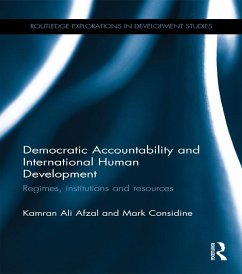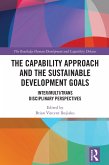This book significantly expands the human development approach. It concentrates on public spending for human development and shows how the broader paradigm of public accountability - extending beyond democratic accountability to also include bureaucratic and judicial institutions as well as modes of tax and resource mobilisation - can best explain how states allocate public resources for human development. In this sense, as this book finds, enhancing human capabilities requires not only effective party competition and fair elections, but also a particular nesting of public organisational structures that are tied to taxpaying citizens in an undisturbed chain of accountability. This volume offers some critical lessons for institutional design and the way we approach the question of human development, particularly in the less developed states.
Dieser Download kann aus rechtlichen Gründen nur mit Rechnungsadresse in A, B, BG, CY, CZ, D, DK, EW, E, FIN, F, GR, HR, H, IRL, I, LT, L, LR, M, NL, PL, P, R, S, SLO, SK ausgeliefert werden.









